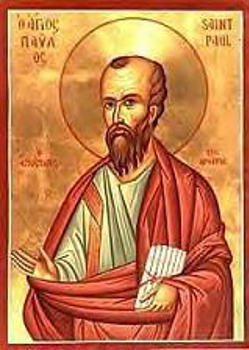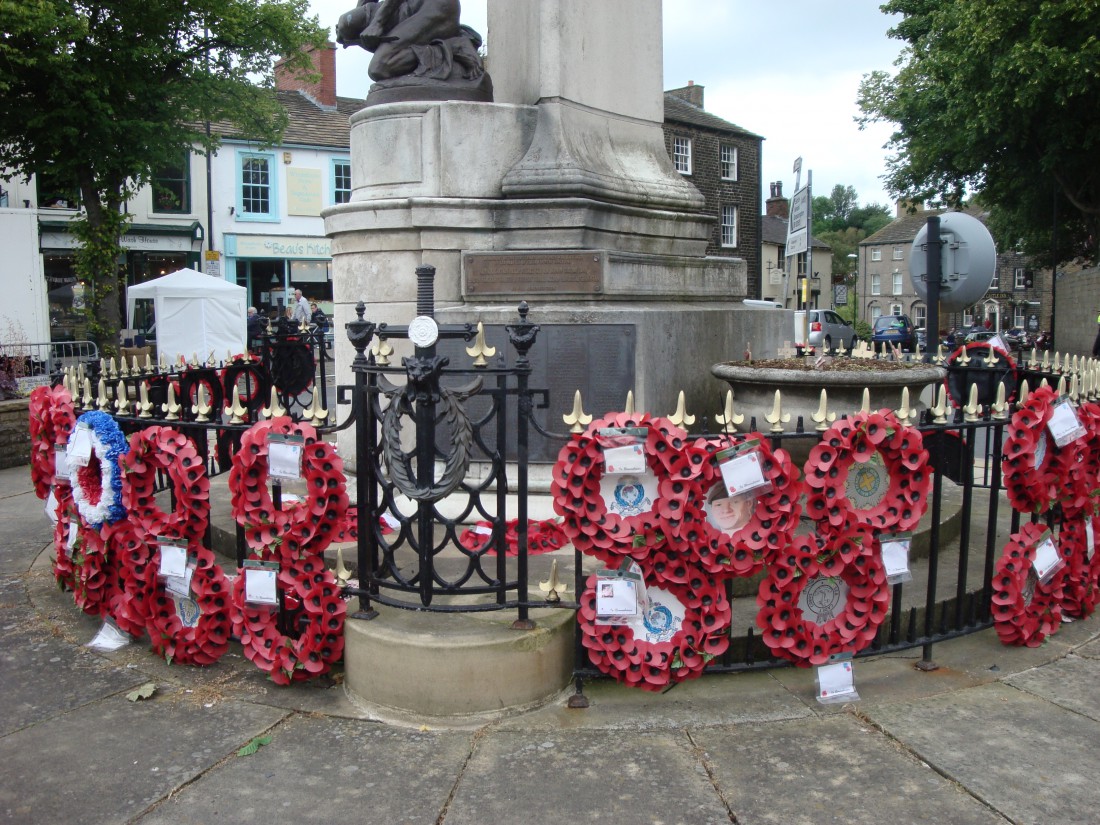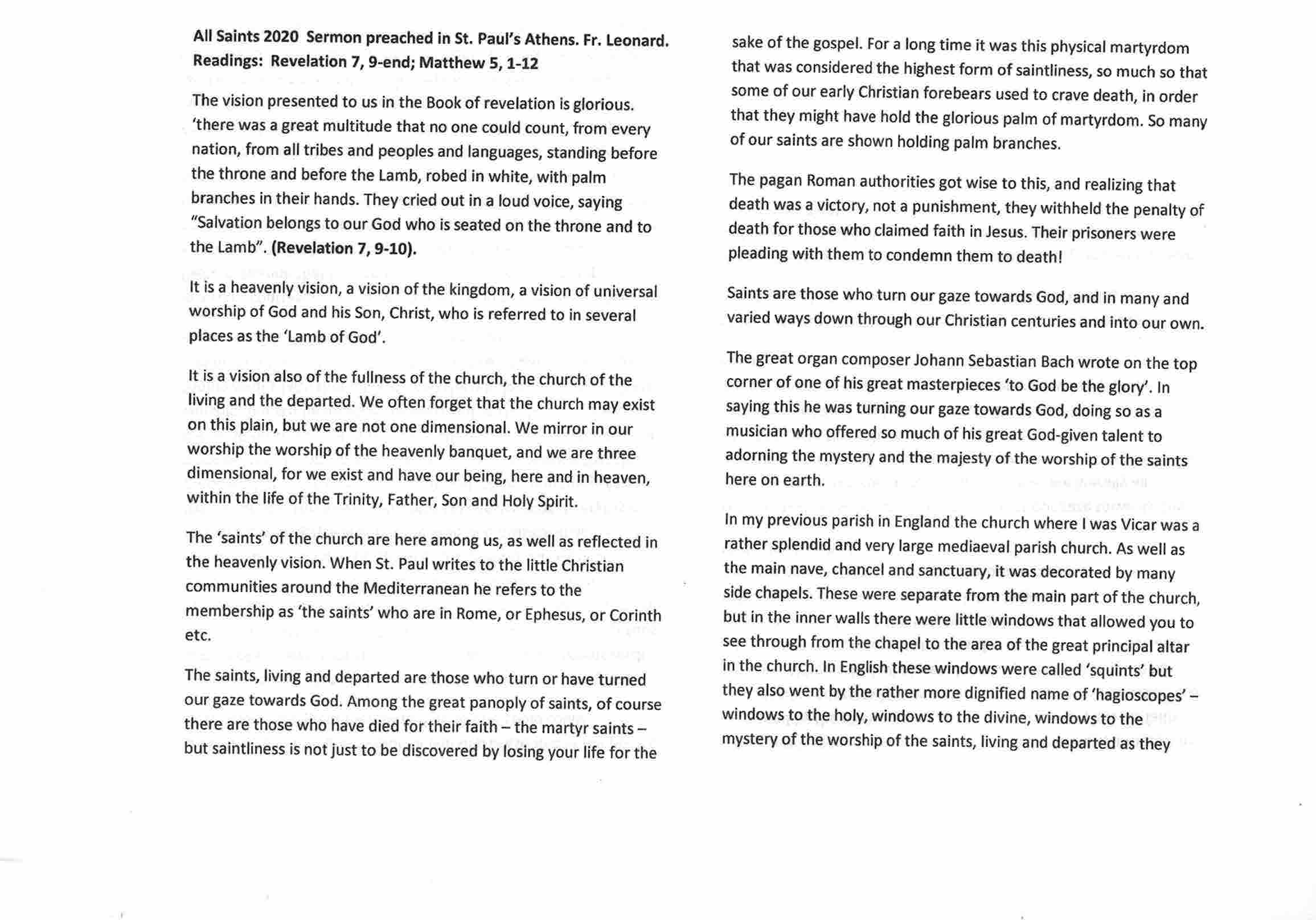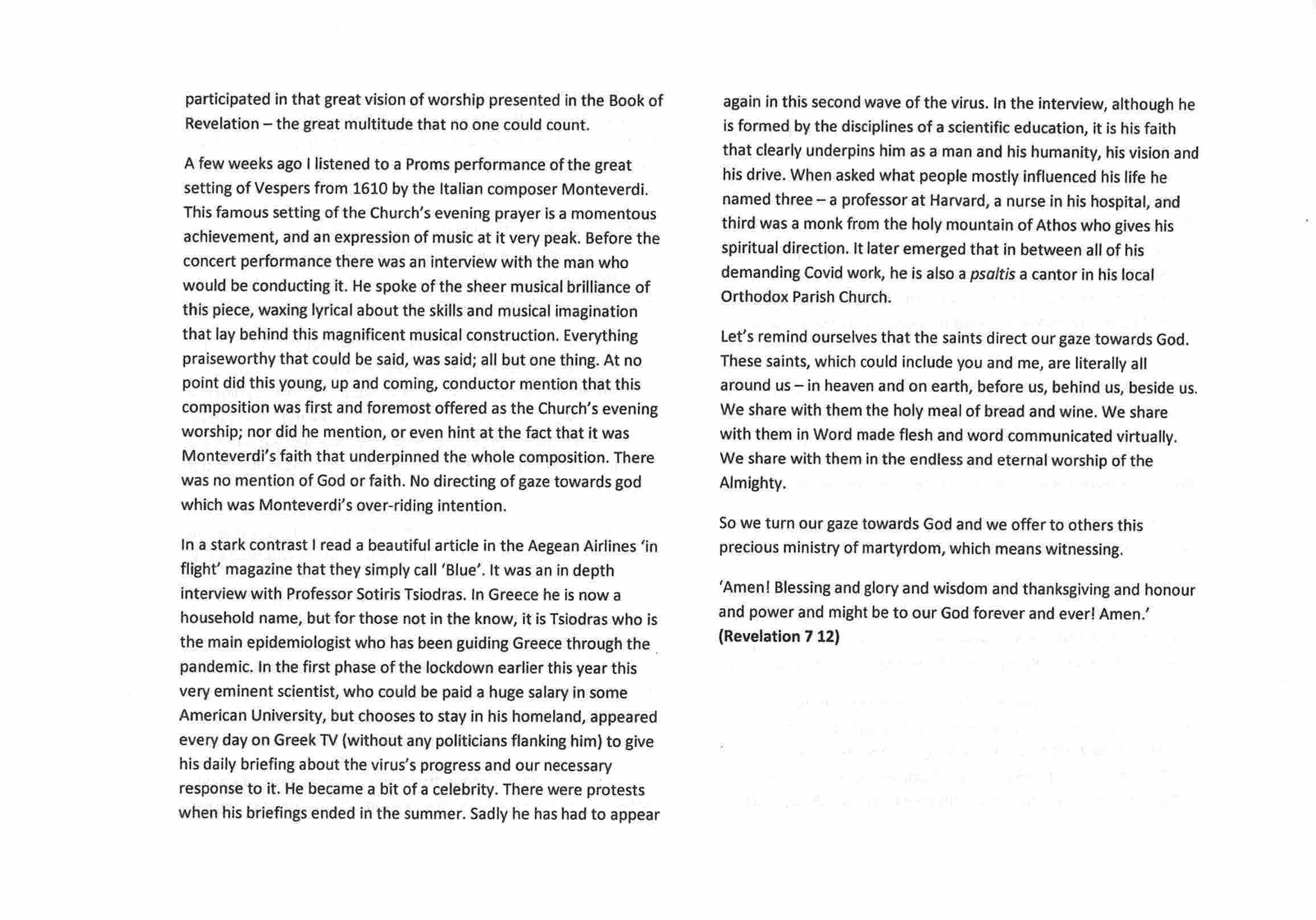Revd. Canon Leonard Doolan – St Paul’s Athens
We will wear our historical hats for a few minutes this morning as we think about the reading from Nehemiah.
The Babylonians attacked and sacked the city of Jerusalem in the year 587/586BC. This is a pivotal date and a key moment in understanding the literature of the Old Testament – and even some of the imagery in the later New Testament, especially in the Book of Revelation.
When the city is taken, and the walls destroyed, so too the Temple of Solomon that had stood there for some 500 years is also razed to the ground and the holy objects of Jewish worship taken as plunder.
The families of the city – those who mattered at least- were taken captive and transported to Babylon. This is present day Iraq. Here the Jewish families, the tribes, experienced an identity crisis. They are in isolation, both physical and spiritual. The temple, so much at the heart of their worship and religious practices was no more. Their access to the familiar is now disrupted and denied to them.
Goaded by their captors to sing some hymns from the temple, they reflect, ‘By the rivers of Babylon – there we sat down and there we wept when we remembered Zion…For our captors asked us for mirth, saying, “Sing us one of the songs of Zion”. How could we sing the Lord’s song in a foreign land.’ (Psalm 137).
In exile, separated and distanced from the familiar it would be so easy for them to forget. History has shown us that our societies can just as easily develop a corporate amnesia as perpetuate a corporate remembrance.
Sitting as they were by the rivers of Babylon they remind themselves of what they have lost – ‘If I forget you, O Jerusalem, let my right hand wither! Let my tongue cling to the roof of my mouth, if I do not remember you, if I do not set Jerusalem above my highest joy.’ (Psalm 137 vss 5-6).
There is surely a lesson here from the past for us in the present and future. Around the world so many faithful Christians are isolated from gathering together, from being sacramental, and have become virtual members of church instead of physically present members of the Body of Christ. However long this Covid restricts us and distances us from one another and from sharing in the real nature of sacramental Christianity, let’s not forget – let’s not develop a corporate amnesia.
But back to the history. In the reign of the Persian King Cyrus a decree was issued that the Hebrew people should be allowed to rebuild their city and temple. This decree was discovered in Ecbatana – a place to become famous later for a battle in the reign of Alexander the Great. Because of the ‘laws of the Medes and Persians’ King Darius is bound to fulfil the command of his predecessor King Cyrus, and so Ezra is despatched to oversee the rebuild and restoration. The book of Ezra and the book of Nehemiah, should really be read as one.
Nehemiah is appointed as Governor of the newly rebuilt city of Jerusalem and the ‘land beyond the river’. The restoration programme had unearthed again the writings of the Law of Moses and it was apparent that in exile the Hebrew people had become detached from their religious heritage, despite their protestations by the rivers of Babylon. They were no longer faithful followers of the Word of Moses. They had lapsed and fallen into a religious apostasy – distance from God.
So Nehemiah relates how Ezra summons the people together. They meet at the Watergate – nothing to do with President Nixon – and with great drama Ezra reminds the people of the historic faith from which they had parted company. They are deeply emotional when they hear this. They stand, and raise their hands upwards, ‘Amen, Amen’ is their cry. They weep when they hear the words of the Lord. Some present were able to interpret for the people what the words truly meant, and the people understood. The people understood.
We are staying with history, but later in the historical religious trajectory. We are in the mid 14th century, and in England. The religion of the nation is Catholic, and the church is all powerful. It is powerful for a number of reasons – property ownership, vast wealth of riches and money. The church controls patronage, it controls penitence, and it controls its dogma of purgatory. But mostly it controls the lives of the people in England, and across Western Europe, by language. The language is Latin, and the only access to worship and the holy books of scripture is through Latin – the scriptures in Latin we call, rather ironically, the Vulgate version. In Latin vulgus means the multitude, the populous, the common mass of people. Latin was hardly the language of the multitude. Latin had caused a distance between the everyday person and God – an apostasy. The Greek scriptures had been translated into this Vulgate version by St. Jerome (Hieronymos in Greek) in Bethlehem. It had been his life’s work. The Vulgate version of the scriptures was the only version in the whole of Western Europe since Jerome in the year 420AD until an Englishman John Wycliffe translated it into the language of the vulgus the people.
Such a movement was happening with scholars and monks all over Western Europe translating the Vulgate into their own language, so that the people could understand – it is the period known as the Reformation.
Hearing their holy scriptures in their own native tongue must have brought sheer joy to the ears of the faithful. They were reminded of the basis for their faith, the foundations that had been denied them for so many centuries. They discovered that there had been a corporate amnesia about their personal knowledge of Jesus, and the things written about him. Salvation suddenly became transformed by understanding; it became personal rather than moderated through the power of the church, a church that had been able to exploit and perpetuate ignorance.
In the language of the people, and now also in the hands of the people after Gutenberg invented the printing press in 1495 in Germany, and Caxton just after him in England, faith is transformed.
I like to imagine that we can compare these two precious moments; the Books of the Law being read to the people at the Watergate in Jerusalem and hearing the basis of the covenant with God, and these Reformation years of people being able to hear and to read (where they could) the holy scriptures in their own language – ‘understanded of the people’ as older English says.
Today is not only the Last Sunday in the holy season of Trinity, it is designated as Bible Sunday. As we look over the trajectory of history there is so much to be thankful for. We can so readily and easily have or own access to scripture; so easy in fact that in most households that have a bible, it is never opened! That is how easy it is.
I won’t mention any names here – but it is easy to stand outside a church in the city of Washington and hold up a bible for the press cameras. It is another thing to open it, read it, pray with it, struggle with it, let your conduct be guided by it, and your holiness developed by it. If we keep it shut, you and me, we will so easily develop another corporate amnesia. Though bibles are so easy to get, we must never forget how precious these words are – for this reason we still read the scriptures in our worship; we process the gospel book, raising it high to show that we are subject to the yoke of the gospel, and in some churches the page is kissed after the gospel is read, to show that these are such beautiful and precious words. Jesus says, ‘Heaven and earth will pass away, but my words will not pass away. ’ (Matthew 24, 35)
Our collect for today says so much better, and so much more succinctly, what I have been trying to share with you today,
‘Blessed Lord, who caused all holy scriptures to be written for our learning; help us to hear them, to read, mark, learn and inwardly digest them that, through patience, and the comfort of your holy word, we may embrace and forever hold fast the hope of everlasting life, which you have given us in our Saviour Jesus Christ, who is alive and reigns with you, in the unity of the Holy Spirit, one God, now and forever. Amen.




















